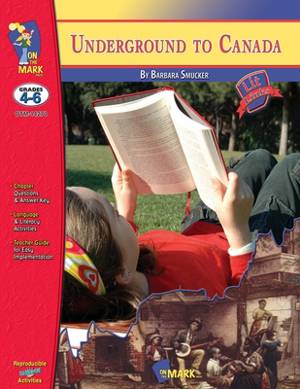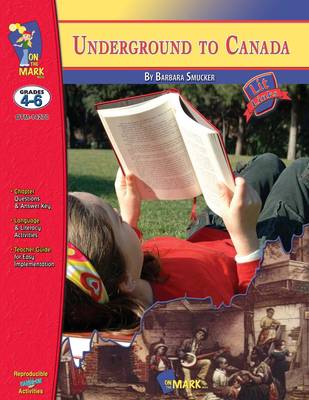
- Retrait gratuit dans votre magasin Club
- 7.000.000 titres dans notre catalogue
- Payer en toute sécurité
- Toujours un magasin près de chez vous
- Retrait gratuit dans votre magasin Club
- 7.000.000 titres dans notre catalogue
- Payer en toute sécurité
- Toujours un magasin près de chez vous
Description
Julilly is a young girl and a slave. She lives on a cotton plantation in Virginia until she's sold and taken to Mississippi, where the food is scarce and the slave boss is very mean. She befriends Liza, a girl who is badly crippled from her beatings, and the two decide to escape to a country they've heard about where slaves are free: Canada. When a white man from Canada arrives and secretly gives them information about how to make the trip, the plan is sealed.
Reproducible chapter questions, plus comprehension questions, a story summary, author biography, creative and cross-curricular activities, complete with answer key.
A novel by Barbara Smucker.
The students will:
- develop their skills in reading, writing, listening, and oral communication
- use good literature as a vehicle for developing skills required by curriculum expectations: reasoning and critical thinking, knowledge of language structure, vocabulary building, and use of conventions
- become meaningfully engaged in the drama of literature through a variety of types of questions and activities
- identify and describe elements of stories (e.g., plot, main idea, characters, setting)
- learn and review many skills in order to develop good reading habits
- provide clear answers to questions and well-constructed explanations
- organize and classify information to clarify thinking
- learn about the history of slavery in the United States
- learn about the abstract concepts of prejudice, terror, injustice, kindness, pride, and courage
- relate events and feelings found in novels to their own lives and experiences
- appreciate the importance of friendship and loyalty in personal relationships
- learn the importance of dealing with adversity and developing perseverance in the face of adversity
- state their own interpretation of a written work, using evidence from the work and from their own knowledge and experience
- learn to accept and understand the horrors of slavery, the range of human behaviors from good to evil, and the importance of self-esteem
List of Activities
Vocabulary Development
1. Identify similes and metaphors
2. Locate descriptive words/phrases
3. Use plurals correctly
4. Use capitals and punctuation correctly
5. Identify syllables
6. Use a dictionary
7. Visualize vocabulary words
8. Use content clues
9. Identify parts of speech
10. Determine alphabetical order
11. Identify prefixes and suffixes
Setting Activities
1. Summarize the details of a setting
2. Draw a setting
3. Compare and contrast settings
Plot Activities
1. Chart a map of movements
2. Sequence events
Character Activities
1. Determine character traits
2. Compare characters
3. Understand concepts such as bravery and self-respect
4. Make inferences about characters' emotions and reactions
Creative and Critical Thinking
1. Reflect on personal opinions
2. Write descriptions of personal feelings
3. Write an editorial
4. Develop research skills
5. Discuss issues with classmates
Art Activities
1. Design a cover for the novel
2. Draw vocabulary and setting
3. Create a song
Spécifications
Parties prenantes
- Auteur(s) :
- Editeur:
Contenu
- Nombre de pages :
- 66
- Langue:
- Anglais
- Collection :
Caractéristiques
- EAN:
- 9781550358988
- Date de parution :
- 01-05-07
- Format:
- Livre broché
- Format numérique:
- Trade paperback (VS)
- Dimensions :
- 216 mm x 279 mm
- Poids :
- 176 g







